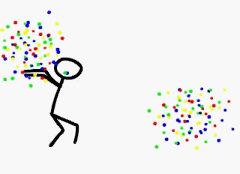Yesterday, I ran across this article, which was linked by a colleague and friend on Facebook: "A Good Professor Is an Exhausted Professor: A North Carolina education bill would be a disaster for research and pedagogy" by Rebecca Schuman. While I think Schuman's writing had a tendency toward snarkiness that sometimes undercuts her argument, I generally respect her pieces as they are fairly interesting to read, and I appreciate that she links so extensively to other sources. This article about North Carolina Senate Bill 593, “Improve Professor Quality/UNC System," sponsored by Republican state Sen. Tom McInnis made me aware of the latest shenanigans from North Carolina's legislature. Sen. McInnis wants to require all faculty in public universities to teach more courses. The bill states that
The Board of Governors shall adopt a policy applicable to all the constituent institutions that requires all professors teach a minimum of eight class courses per academic year. The salary of any professor who teaches less than the required number of classes shall be reduced on a pro rata basis, but may be supplemented with the proceeds of the constituent institution's endowment fund. The policy shall also require an annual independent audit 15 of each constituent institution to determine compliance.It occurred to me as I read Schuman's that the stories underlying this pending legislation directly relate to the discussion I led last week on Linda Adler-Kassner's The Activist WPA: Changing Stories About Writers and Writing. What I see in this attempt to legislate faculty workloads is a case of competing frames.
For McInnis, this is an attempt to put more experienced professors in front of undergraduate students rather than having adjunct or graduate student faculty teach introductory courses. According to a Daily Tar Heel story by Hallie Dean,
McInnis contends that professors’ primary role is course instruction, saying in a statement that university students should actually be taught by professors, not student teaching assistants... “There is no substitute for a professor in the classroom to bring out the best in our students,” McInnis said. “I look forward to the debate that will be generated by this important legislation.”Dean's story also notes that "UNC-system faculty" teach an average of 3.7 course per semester and tenured faculty teach 2.5 courses per semester. At research universities, like UNC-Chapel Hill, teaching a 2/2 course load is more common because the expectation is that faculty are engaged in research in their field. Tenure decisions for 4-year university faculty weigh such research quite heavily, especially at top-tier research institutions. I've been told that one of the common questions asked of prospective new-minted PhD faculty at similar institutions is "when will your first book be published?"
Colleges like UNC want the story to be about research, and Schuman's piece clearly presents the consequences to the university and the wider community if that research story becomes drowned out by McInnis' course instruction frame: The Research Triangle "would quickly lose two of its prongs—the University of North Carolina at Chapel Hill and North Carolina State University."
The cynic in me sees another motive: money. Dean's news piece also quotes Jay Schalin, director of policy analysis at the conservative Pope Center on Higher Education Policy, who talks of the "salary costs for the UNC system."
"Obviously, if teachers are more productive, the schools will need fewer teachers to teach the same number of students,” said Schalin in an email.So, really, the story here isn't as much about teacher quality as it is about productivity. That is to say, those lazy damned professors should spend their time professing and not wasting our tax money on their silly research and learning.
But isn't the role of a professor to be the lead learner in the class? If the lead learner isn't learning, can we really say we value learning?

